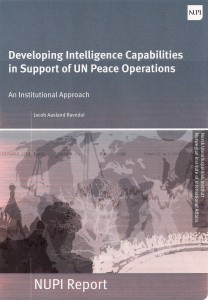
The author has produced a useful but slightly incomplete merger of information on the past decade of efforts to develop UN intelligence (decision-support) capabilities, within the prism of an imposed social science investigation construct which dilutes the practical value.
This is precisely the kind of document that we need to make easily available to the public. One of the mistakes made by the JMAC course in Norway, but not made by the Multinational Information Sharing Course in Sweden, has been to quote PKI One but not use the principal pioneers directly, meaning that they lose the 80% of the knowledge that is not in print. We have worked hard to create the concept of public intelligence and to make intelligence better understood as DECISION SUPPORT, which is a process consistent with the Brahimi Report.
The report does not reflect definitions of intelligence as DECISION SUPPORT and also over-looked GeneralCammaert and the rest of us at the Swedish conference on PKI (the Canadian conference and book are not worth much), where Cammaert is on record as sayingthat intelligence is no longer a dirty word at the highest levels of the UN. PKI 2004 Trip Report.
The UN is making the mistake of relying on Member states all of whom have definite biases and agendas. A global intelligence capability is needed that cansynthesize and analyze from the perspective of the whole rather than from the perspective of individual pieces. It is also important to emphasize the degree ofignorance and arrogance on the part of the Member states–not to be under-estimated. HOWEVER, ClimateGate is a good example of what happens when theUN loses its own integrity–the opposite case is the High Level Panel on Threats, Challenge, and Change, that is “Ref A” for the future of UN intelligence.
Requirements definition–what do you need to know ONE THIRD OF GETTING IT RIGHT–definition
Collection management–know who knows, know how to access the 80% that is not online, not in English, and/or not visible via Google (deep web, C drives, hard copy, gray lit)
Source discovery and validation–like art, the provenance of a source is essential to place it in cultural, historical, ideological context–discovery and discimination
Above two are ONE THIRD OF GETTING IT RIGHT
Multi-source fusion–machine speed and human evaluation, exploitation, visualization and presentation–distillation
Compelling, actionable, timely, relevant, precise presentation to the decision maker or decision making groiup–delivery and dissemination.
Open Source Information (OSIF) is GENERIC. Open Source Intelligence is APPLIED to a SPECIFIC decision need.
The six D's: definiton, discovery, discrimiation, distillation, delivery, dissemination.
“The truth at any cost reduces all other costs”
See also: Search: United Nations Intelligence Training



